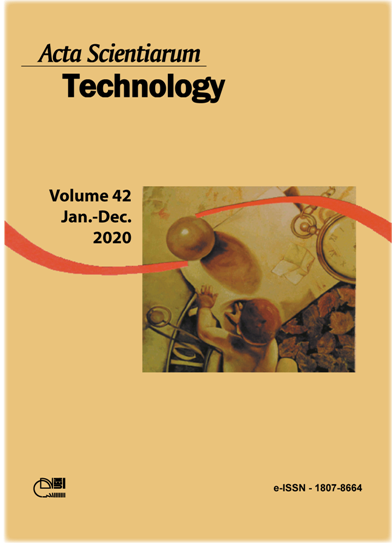Removal of sodium compounds from Co/SBA-15 catalysts for Fischer-Tropsch Synthesis
DOI:
https://doi.org/10.4025/actascitechnol.v42i1.45899Palavras-chave:
sodium removal, Fischer-Tropsch Synthesis, cobalt catalysts, EDTA, ethanolResumo
In the present work, the synthesis of Co/SBA-15 catalysts intended for Fischer-Tropsch (FT) synthesis was performed. During the synthesis of catalysts there was contamination of samples with sodium nitrate due to the nature of the reducing agent used for the synthesis of metallic phase. This kind of impurity is not advantageous for the FT reaction. Attempts at removal of sodium compounds were carried out by means of simple leaching treatments, using ethanol and acid ethylenediaminetetraacetic (EDTA) as solvent and complexing agent, respectively, followed by heat treatment at temperatures of 150 or 300°C. It was possible to conclude that the treatment using EDTA was more effective in removing almost all the alkaline phase of samples, despite the occurrence of oxidation, agglomeration, and removal of the metal nanoparticles in this process. In addition, there were no significant differences in the product selectivity of FT synthesis of the catalysts after sodium removal, although the nanoparticles were larger than 10 nm.
Downloads
Downloads
Publicado
Como Citar
Edição
Seção
Licença
DECLARAÇíO DE ORIGINALIDADE E DIREITOS AUTORAIS
Declaro que o presente artigo é original, não tendo sido submetido í publicação em qualquer outro periódico nacional ou internacional, quer seja em parte ou em sua totalidade.
Os direitos autorais pertencem exclusivamente aos autores. Os direitos de licenciamento utilizados pelo periódico é a licença Creative Commons Attribution 4.0 (CC BY 4.0): são permitidos o compartilhamento (cópia e distribuição do material em qualqer meio ou formato) e adaptação (remix, transformação e criação de material a partir do conteúdo assim licenciado para quaisquer fins, inclusive comerciais.
Recomenda-se a leitura desse link para maiores informações sobre o tema: fornecimento de créditos e referências de forma correta, entre outros detalhes cruciais para uso adequado do material licenciado.



















